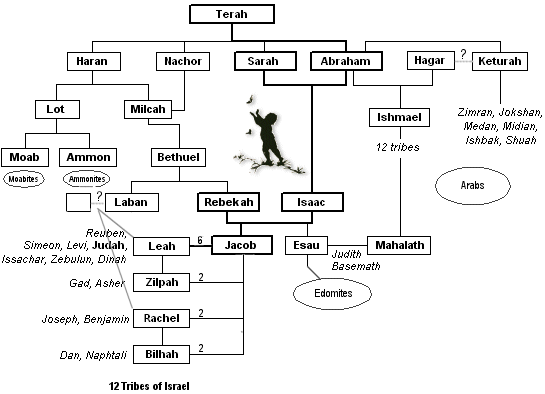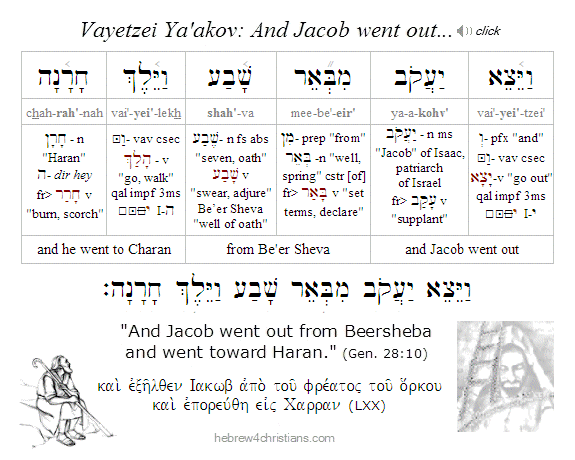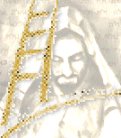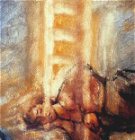|
|
 |
 |
 |
 |
|
Weekly Torah Reading
|
|
|
|
Parashat Vayetzei ("and he went out")
|
|
|
Click on the links to display the Scriptures:
|
|
|
|
 |
 |
|
"Jacob went out from Beersheba and went toward Haran." (Gen. 28:10)
|
 |
 |
|
While Jacob was on the way to Haran, he came to a "certain place" (bamkom) and camped there for the night. Using a stone for a pillow, he dreamt of a ladder (sullam) that was set on the earth that reached to the heavens, with the angels of God (malakhei Elohim) ascending and descending upon it. Then the LORD Himself (YHVH) stood above the ladder and promised Jacob that his offspring would be like the dust of the earth, and that through Him all the nations of the earth would be blessed.
|
|
|
 |
 |
|
When he awoke from this dream, Jacob was awestruck and called the place "the house of God" (bet Elohim) and the "Gate of Heaven" (sha'ar hashamayim). The following morning, he took the stone he used as a pillow, anointed it with oil, and consecrated the place as Bet 'El (Bethel). Then he made a vow (neder) that if the LORD would be with him, providing for his needs until he returned home to Beersheva, he would tithe to God one-tenth of all of his possessions and would return to worship and pray at the altar he had just consecrated.
|
|
 |
 |
|
When he finally reached Haran, Jacob encountered some shepherds who were gathering their sheep at the local well. After enquiring about the welfare of his uncle Laban and discussing their method of watering the sheep, he saw his beautiful cousin Rachel bringing her father's flock to the well. Jacob immediately rolled away the stone from the mouth of the well, watered her flock, and kissed her. He told her that he was her cousin, her father's sister's son Jacob, who had come from the land of Canaan. Rachel then ran home and told her father Laban, who invited him to stay with him.
Jacob had immediately fallen in love with his cousin Rachel and eagerly agreed to work as Laban's shepherd for seven years in order to marry her. After the seven years elapsed, however, Laban "supplanted" Jacob's desire by swapping his eldest daughter Leah for Rachel on the very wedding night -- a deception Jacob later discovered the next morning (presumably Jacob was a bit intoxicated with the previous evening's festivities to not notice the switch!). After protesting to Laban, Jacob was allowed to marry Rachel a week later -- provided that he agreed to work seven more years for his dear father-in-law!
Next comes the account of the birth of the twelve sons of Jacob (i.e., the twelve tribes of Israel). When the LORD saw that Leah was unloved by Jacob, he "opened her womb" while her sister Rachel remained childless. Leah gave birth to Jacob's first four sons: Reuben, Simeon, Levi and Judah. When Rachel realized that she was barren, she followed her great grandmother Sarah's example and offered her handmaiden, Bilhah, to be a surrogate wife. Bilhah then bore Jacob's next two sons: Dan and Naphtali.
In the madness of this sibling rivalry, Leah thought she had stopped being able to bear children, so she gave her handmaiden, Zilpah, to Jacob as a surrogate wife. Zilpah then bore two sons: Gad and Asher. However, Leah was not finished with her childbearing after all, and gave birth to two more sons, Issachar and Zebulon.
Finally the LORD remembered Rachel's prayers and she gave birth to a son, Joseph (she also gave birth to Benjamin, but that account is given in next week's parashah).
Jacob's Twelve Sons:
The sons of Jacob are listed here for your reference:
|
 |
|
|
|
#
|
Son
|
Meaning
|
Mother
|
|
1
|

|
Reuben; "See, a son!"
|

|
|
2
|

|
Simeon; "hearing" or "heard"
|

|
|
3
|

|
Levi; "joined to" or "attached"
|

|
|
4
|

|
Judah; "praised"
|

|
|
5
|

|
Dan; "a judge"
|

|
|
6
|

|
Naphtali; "wrestling"
|

|
|
7
|

|
Gad; "troop," "company"
|

|
|
8
|

|
Asher; "happy"
|

|
|
9
|

|
Issachar; "there is recompense"
|

|
|
10
|

|
Zebulon; "exalted," "honored"
|

|
|
11
|

|
Joseph; "may he add"
|

|
|
12
|

|
Benjamin; "son of the right hand"
|

|
|
 |
 |
|
Now after Joseph was born, Jacob wanted to return to Beersheva to see his parents and to settle back in the Promised Land. However Laban persuaded him to remain, offering him sheep in exchange for his labor. Despite his father in law's repeated attempts to cheat him, Jacob nevertheless prospered, since God was with him. After six more years of service, Jacob received a vision from the LORD telling him it was time to return to the land promised to his descendants. After discussing the matter with Rachel and Leah, Jacob decided to flee from the clutches of Laban while he was away shearing sheep, since by this point it was apparent that his father-in-law never would let him leave in peace.
Just before the flight from Haran, Rachel stole her father's idols, perhaps intending to cause him bad luck. Three days later, Laban discovered that Jacob had fled. He gathered his men and pursued him, finally catching up to him seven days later at the mountains of Gilad. However, the LORD appeared to him in a dream and warned him not to try to influence Jacob to return to Haran. Laban then rebuked his son-in-law for having left by stealth and accused him of stealing his idols. Jacob denied the accusation and (unwittingly) proclaimed that the real thief would die (a prophecy that was later to be fulfilled with the premature death of Rachel). After searching through Jacob's possessions (which proved fruitless since Rachel had carefully hidden the idols), Jacob was able to finally give his evil father in law a piece of his mind: "These twenty years I have been in your house. I served you fourteen years for your two daughters, and six years for your flock, and you have changed my wages ten times. If the God of my father, the God of Abraham and the Fear of Isaac, had not been on my side, surely now you would have sent me away empty-handed. God saw my affliction and the labor of my hands and rebuked you last night."
Laban and Jacob then parted after making a peace treaty attested to by a pile of stones. Laban (who was from Paddan-aram, or Syria) called the pile of stones Yegar-sahadutha (Aramaic) but Jacob called it Gal-Ed (Hebrew for "heap of witness").
Jacob then got on his way back to the land of Canaan, where he was met by angels from God (malakhei elohim). When he saw the angels, he exclaimed, "This is God's camp!" and called the name of the place Machanayim ("two camps"). The parashah ends with Jacob sending messengers before him to his brother Esau in the land of Edom, explaining that he was returning to his homeland after his long sojourn in Haran.
|
 |
 |
 |
 |
 |
|
Haftarah Reading Overview
|
|
|
|
The reason for the selection of this Haftarah for Parashat Vayetzei is obvious from the very first verse: "Jacob fled to the land of Aram; there Israel served for a wife, and for a wife he guarded sheep" (Hosea 12:12). Here the prophet Hosea used the story of Jacob's experience in Laban's household, where he was forced to serve seven years each in order to marry Leah and Rachel, in order to express God's displeasure with the children of Israel.
Hosea chides Ephraim [another name for the northern kingdom] for its idolatrous practices. God's providence and care for their forefather Jacob and for the entire nation during their desert sojourn made their very existence possible, but these descendants of Jacob had turned to idols and placed false hope in Assyria as their protector.
Therefore, judgment was coming, and the LORD asks, "Shall I ransom them from the power of Sheol? Shall I redeem them from Death? O Death, where are your plagues? O Sheol, where is your sting? Compassion is hidden from my eyes" (Hos. 13:14).
At the end of the Haftarah, the Hosea's message changes from the imminence of judgment upon the northern kingdom to an appeal to the people to repent and return to the LORD. "Shuva Yisrael - Return O Israel - unto the Lord your God, for you have stumbled in your iniquity" (Hosea 14:1). There was still hope for Ephraim if they would turn away from their idols, confess their sins, and call upon the Name of the LORD. If they only would do so, God would heal their apostasy, love them freely, and cause them to inherit all of His blessings.
שׁוּבָה יִשְׂרָאֵל עַד יְהוָה אֱלֹהֶ֑יךָ כִּי כָשַׁלְתָּ בַּעֲוֹנֶךָ
קְחוּ עִמָּכֶם דְּבָרִים וְשׁוּבוּ אֶל־יהוה אִמְרוּ אֵלָיו
כָּל־תִּשָּׂא עָוֹן וְקַח־טוֹב וּנְשַׁלְּמָה פָרִים שְׂפָתֵינוּ
shoo·vah Yis·ra·el ad Adonai E·lo·hey·kha kee kha·shal·ta ba·a·vo·ne·kha
ke·khoo ee·ma·khem de·va·reem ve·shoo·voo el-Adonai eem·roo e·lav
kohl-tee·sa a·vohn ve·kach-tohv oo'ne·sha·le·mah fa·reem se·fa·tey·noo

Return, O Israel, to the LORD your God, for you have stumbled because of your iniquity.
Take with you words and return to the LORD; say to him, "Take away all iniquity; accept what is good, and we will pay with bulls the vows of our lips." (Hos. 14:1-2)
|
|
|
|
 |
|
|
|
Brit Chadashah Overview
|
 |
 |
|
And he said to him, "Truly, truly, I say to you, you will see heaven opened, and the angels of God ascending and descending on the Son of Man" (John 1:51).
In this passage Yeshua makes explicit reference to Jacob's dream in Bet 'El. Just as Jacob saw the ladder (sullam) ascending to heaven with the angels of God ascending and descending upon it, so Yeshua tells Nathanael that He is the very Ladder to God, the true sha'ar hashamayim - the Way into heaven (John 14:6).
|
|
|
 |
 |
|
Yeshua is the Sullam (Ladder)... Heaven has indeed been opened and is mediated by the Life and grace of Messiah as our Bridge to God. Jacob dreamed a dream, but Yeshua became the Substance of that dream by willingly becoming the Promised Seed of Jacob. It is through Yeshua, the Promised Seed, that all the nations of the earth are blessed.
|
|
 |
 |
|
Yeshua is the true Temple or "house of God" (bet Elohim) and its Chief Cornerstone (Matthew 21:42). He is the divine communication (Word) from heaven to earth. The Son of Man is God's link with the children of Adam (Dan. 7:13; Matt. 26:64). Yeshua is the new "Bethel," God's dwelling place (Gen. 28:17; John 1:14). Nathanael and the other disciples witnessed the glory of God come down to mankind in the Person and Life of Yeshua the Mashiach. Just as Jacob awoke and realized he was in the awesome presence of God, so Nathanael realized that he was in the presence of the very LORD of the universe!
Heaven stands wide open and now the grace of God is available for every person who believes in the Son of Man. Yeshua is the Bridge. You can come into God's presence by means Him. He is the "door" and the "gate." No one comes to the Father except through Him. Ask Him to connect you with the infinite and loving condescension of heaven today.
|
|
|
 |
 |
|
Hebrew Audio Files:
|
|
 |
 |
|
Click the following links to hear the desired chapters read from this week's Torah:
|
|






